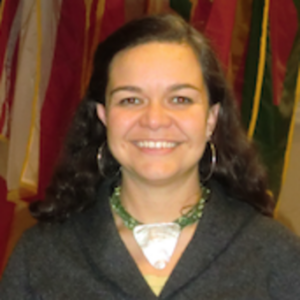
Betzabe Castañeda Blanco
Betzabe is a Library Assistant in the Adult Services Department at CDPL.

Ivette de Assis-Wilson
Ivette is the Adult Services Department Manager at CDPL.
From September 15 to October 15 we celebrate National Hispanic and Latino Heritage Month. The terms Hispanic and Latino (or Latine, Latinx) are loaded with their complexities and problematic uses in their own right. The most basic definition refers to linguistic heritage in conjunction with geographical location. Hence, individuals whose families come from Spanish-speaking Latin American countries are labeled Hispanics. “Latin America” refers to countries south of the border where Romance languages, those descended from Vulgar (ordinary) Latin and spoken by ancient Romans, are used (e.g., Spanish, Portuguese, and French). Thus, “Latinos” (and Latines, Latinx) seek to include all individuals whose ancestry lies in one or more Latin American countries.
While widely used, often debated, and sometimes (mistakenly) interchanged, both definitions have been contested by politicians, cartographers, and language experts. Most of all, those terms are challenged by Indigenous and other peoples who inhabit those geographic spaces or have experienced migration – willingly or not. Therefore, in the spirit of solidarity and community, your local library is here to give you the tools to learn more and be a well-informed participant in current conversations. Our monthly display “¡Somos!” (We Are!) offers a bilingual dive into the art and literatures produced by and about our neighbors, and provides us with a window into their lived experiences.
The national theme for this year’s celebration is “Pioneers of Change: Shaping the Future Together.” You can learn about trailblazer Chita Rivera, born Dolores Conchita Figueroa del Rivero, in “Chita: A Memoir” (921 Riv). This multi-Tony Award winner, Kennedy Center honoree, and Presidential Medal of Freedom recipient created some of Broadway’s most iconic roles in American culture, including Anita in West Side Story. You may also read Ingrid Rojas Contreras’ Pulitzer Prize finalist “The Man Who Could Move Clouds: A Memoir” (921 Rojas Contreras, I.). Daughter of a fortune-teller and granddaughter of a curandero (healer), for Rojas Contreras, magic runs in the family. While living in the US, she suffers a head injury in her twenties that leaves her with amnesia. As she partially regains her memories, she returns to Colombia with Mami and traces her lineage back to her Indigenous and Spanish ancestors. Family stories and Colombian history intertwine as the author faces the constraints of reality.
In “Our Migrant Souls” (305.868 Tob) Pulitzer Prize winner Héctor Tobar explores the twenty-first-century Latino experience and identity in the United States. Not only does Tobar address his life as a journalist and novelist, but he also shares his experiences as a mentor, a leader, and an educator. “Our Migrant Souls” was the winner of the Kirkus Prize for Nonfiction, and one of Time’s Must-Read Books of 2023. Curious about historical events and courageous people who inhabited our borders? “Revolutionary Women of Texas and Mexico: Portraits of Soldaderas, Saints, and Subversives” (972.08 Rev) celebrates the women of early Texas and Mexico who stood up for their ideals and refused to walk a traditional path.
In our display, you will also find fictional stories from accomplished writers. “The Words That Remain” (FIC Gardel), by Brazilian author Stênio Gardel, was the 2023 National Book Award Winner for Translation. Described as a novel of violence and shame, as well as survival and endurance, it “explores the universal power of the written word and language, and how they affect all our relationships.” “Our Share of Night” (FIC Enr) by Mariana Enriquez is a masterpiece of supernatural horror and familial drama. Set against the backdrop of Argentina’s military dictatorship and its aftermath, the novel explores themes of love, loss, and the lengths a parent will go to protect their child. If you enjoy historical fiction, Isabel Allende’s novel “The Wind Knows My Name” (FIC Allende) / “El viento conoce mi nombre” (SPA FIC Allende) is available in both English and Spanish. The novel blends timelines and follows two children: Samuel Adler, a Jewish boy who escapes Nazi-occupied Austria in 1938, and Anita Díaz, a blind seven-year-old girl from El Salvador who, in 2019, flees to the United States with her mother, only to be separated at the border due to the family separation policy. The novel highlights the enduring impact of trauma as well as the transformational power of support, friendship, and resilience.
Our monthly display “¡Somos!” at CDPL offers the opportunity to explore the rich tapestry of Latino culture and history. These stories of resilience, innovation, and community not only honor the past but also inspire us to envision a brighter future. By delving into the lives and contributions of these trailblazing individuals, we can gain a deeper appreciation for the diverse voices that continue to shape our world. Visit the second floor of the library today and embark on a journey of discovery, empowerment, and celebration. Together, let’s honor the pioneers of change and shape the future with their enduring legacy.
